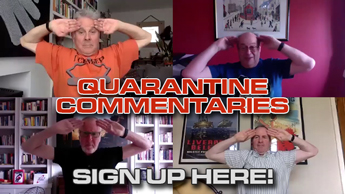 |
Night Sweats Despite a deep dark sense of foreboding, Mr Flibble ventured forth to talk to a master of horror. He's the man who put a hook on Candyman's arm and did something really nasty to Pinhead - British export and best-selling horror novelist, Clive Barker. |

Andrew Ellard
Mr Flibble began the interview by saying Clive's name five times. Clive intimated that he had never heard that one before. Mr Flibble elected to hide behind the sofa for the duration of the interview.
Andrew asked about Clive's first published work - the Books of Blood...
Woody Allen said about Everything You Always Wanted to Know About Sex *but were afraid to ask (1972) that it contained all the funny ideas he could think of about sex, including several that led to his divorce. When I wrote the Books of Blood, the idea was to put within the pages of what turned out to be six volumes, all the ideas pertaining to horror that I could think of - including several that would have led to analysis had I had to money to get an analyst.
The idea was to tell some horrific stories, some psychologically scary stories, some comical stories, some sexy stories... In other words, to prove to the reader that horror could be a whole new vocabulary. And one of the things I wanted to do was write about horror without any self-censorship whatsoever. And I suppose to some extent I'm responsible for writing a kind of horror fiction that just looked plainly at all this stuff and said, 'Okay, I don't care how disgusting it is, I'm going to put it on the page.'
Mr Flibble refused to come out, even when threatened with the loss of his interview fee. Andrew apologised and asked about Clive's directorial debut Hellraiser (1987) - adapted from his own story, The Hellbound Heart...
I was writer-director, as opposed to being a writer who didn't have much power and was treated rather badly by the producers. The first two movies - Rawhead Rex (1986) and Underworld (1985) - were pictures I just couldn't bear. So in a sense I went to make Hellraiser as an act of self-defence, to see whether it was possible to make a horror movie - with a very limited budget - that didn't insult my own intelligence.
What I couldn't predict, what you can never predict, is that an element or two elements in the movie - the image of the box, the puzzle box which gives you access to Hell; and of course the image of Pinhead - would catch on on such a level, and in so many places around the world. You can never plan that. It's led to more sequels, a line of comic books, plastic models... And it's a phenomenon that I don't truly understand - otherwise I'd do it again. (Laughs)
Mr Flibble muttered something about the stress of directing for the first time before vanishing behind the sofa again. What was it like walking onto the set on the first day?
You suddenly think, 'Oh, hell, they put me in charge of this ship and I don't know how to drive it!' (Laughs) I was surrounded by really great people. The pressure was not that heavy, because I was ignorant of the pressure. There wasn't a sense like, 'Oh my God, will I be able to pull this off?' Because what was there to pull off? We had a million dollars, we were in this house on Dulles Hill, it all looked very, very low-key, and in truth it was very low-key. I had a great editor [Richard Marden], a great DP [Robin Vidgeon], a great team all around me; people who were very considerate of my ignorance. I was very up-front about it, I said, 'Listen, I've been on a film set once before in my life. Help me.' (Laughs) And they were cool, they were great.
That also worked with the actors, many of those actors I worked with in theatre; I've known Doug Bradley, who plays Pinhead, since I was 15 or 16. I was very comfortable with that part of it. And the special effects I also felt fairly comfortable with. The technical stuff was a mystery to me. I had to go from page one in all of that stuff. It was a steep learning curve - and there's nothing more exciting than that, than being in a position in which you're obliged to learn quickly.
You also directed Nightbreed (1990) - was that a difficult movie?
Nightbreed had a difficult thesis. I wanted to make a horror movie in which all the monsters were sympathetic. If someone goes to a horror movie, they want to be horrified; they want the monsters to be disgusting and repulsive.
I wanted to make a movie that said, 'Actually the dynamic is slightly more complex than that. See past this stuff, see past the horror to something else.' And I think it's very difficult. I don't think I realised when I started off - otherwise I might not have started off! - but it's a very difficult case to prove, because people come to a horror movie, as I said, expecting to be horrified and [it's] faintly antagonistic if you don't do it to them.
It's bizarre really, because horrifying people is, in a sense, an antagonistic act in the first place. A good horror movie is a sort of act of aggression. You do feel 'aggressed against' by horror movies, and I was making a movie which worked against that grain. I think I set myself an unsolvable problem - but, like all unsolvable problems, sometimes the process of attempting to solve it is actually more interesting than setting yourself a problem to solve.
Mr Flibble had by this point placed a small bowl over his head, which thankfully Mr Barker ignored in favour of a discussion of Candyman (1992).
Candyman [was] brilliantly directed by Bernard Rose, with a score by Phillip Glass, and is, I think, a tremendous movie. I executive produced. Candyman is based upon a short story in the Books of Blood, a story called The Forbidden about urban legends, it's an idea which attracted Bernard and we worked together on it.
Tell us about the urban legend idea that Candyman was based around - scare Mr Flibble completely...
The image of the hook-handed lunatic out on the loose is completely common to British culture [and] American culture. It's a fundamental urban legend - the lovers in lovers lane making love in the car and hearing the sound of...
Mr Flibble let out a penguin yelp, cutting Clive off...
Urban legends are fascinating because they're so often grizzly! They're so much a reflection of our deep-seated desire to be told terrible things! (Laughs) There are a lot of very funny urban legends, there are a lot of grotesque urban legends, but the both of them seem to be tales to terrify us. And what is particularly terrifying about the urban legend is that it operates on the basis of 'This Is Real.' That this happened.
One of the important elements of the urban legend is that it happened to somebody you know, or somebody who knows somebody you know. That it should be relatively close to you. And it seemed a perfect subject for a movie. I mean in a sense it's a metafiction, because it's about the business of being horrified.
I must ask - do you have nightmares?
Do I have nightmares? No. It's the second most often asked question - after, 'Where do you get your ideas from?' No, my psyche seems very happy to deal with these anxieties, which are anxieties common to us all - they're about dismemberment and insanity and violent death, in a relatively public arena. I don't repress the thoughts, and so they don't come and find me in the middle of the night. I have very sweet dreams.
After such a predictable question, Andrew attempted to resign from the interview business, but Mr Flibble was booking a very fast taxi and couldn't help him. Have you ever been ripped off?
By other people? I am very aware that I started something. (Laughs) That's on the sour days. On the good days you realise that in fact everybody is influenced by other people. There's a tradition going on here. What I do is unthinkable without Lovecraft and Poe and Arthur Machen and Ramsey Campbell and Stephen King and Ray Bradbury - and maybe what some people are doing now would be unthinkable without Clive Barker.
In what ways do you prefer the written word to cinema?
The trouble is we don't live in a world of extreme experiences. Despite the access we have to all this imagery, through television primarily, it all gets beaten down to a sort of pastel pulp. Standing alone on a beach is a uniquely wonderful, glorious experience. The sea, which you've completely taken for granted, is actually not like the sea as it appears on television, is not like the sea as it appears in the cinema - you and your relation to the sea is a very simple, pure thing. You can mainline on the experience.
One of the things with fantasy and horror fiction I think is you're trying to slap the reader - first yourself and then the reader - into reassessing the world and saying, 'Boy, aren't things wonderful! And terrifying...'
Books are user-friendly, they interact with you. We could both read Moby Dick now and have completely different ideas about the book that we just read. If we both went to see John Huston's film of Moby Dick (1956), basically the experience would be fundamentally the same for us both.
So how do you approach working in different media?
You always aim to do something in any given medium that is really only possible in that medium. 2001: A Space Odyssey (1968) is really only a movie. You put that in comic book form and it's horribly reduced; you put that in literary form and then you start to have to do things with those images and compartmentalise them in a way you don't want to. King Kong (1933) is unthinkable except as a movie. The Bride of Frankenstein (1935), one of the greatest horror movies of all time, Psycho (1960) - these are wonderful movies. Now it's also true that there are extraordinary books - Arthur Machin's work would be an example, Lovecraft would be an example, Bradbury I think - writers whose work really completely defies every other form but the literary form.
People come out of movies and say, 'Well, it wasn't like the book.' Well of course it wasn't like the book - it was a movie! I mean, that's part of the pleasure of it. I work in the movies, comic books, illustrations, novels, and they're completely different kinds of experiences, and I want to continue working in all of them and investigate unique ways to talk about whatever's going on in here (taps head) and reach different kinds of people in different ways. It's all finally the job of a proselytiser, all you really want to do is actually go out there and say, 'This is my imagination, share it, partake of it.'
A shivering Mr Flibble had vanished by the end of the interview to get himself a strong drink. Because he was left to do the interview on his own...Andrew is very cross.














